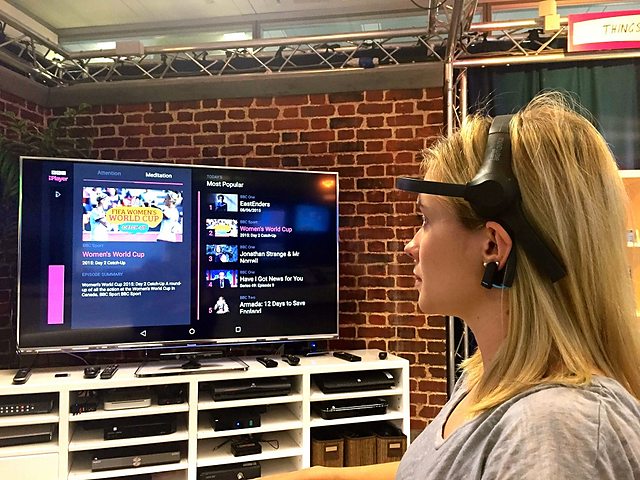BBC developers have learned to control TV with the help of thoughts

The digital technology research department of the British broadcaster BBC spoke about its experiences related to managing digital television through thought. No fiction: Experimental equipment is used in the experiments, which reads an electroencephalogram of the brain and converts brain waves into commands for the TV.
')
In the experiment, ten company employees tried to control the selection and reproduction of the program, and everyone managed to do it. Someone was easier, someone more difficult, but in general, the device successfully coped with the task.
The device is a bezel with two sensors attached to it, one of which is located near the forehead, and the other is attached to the earlobe. Sensors measure the electrical activity of the brain. The user can choose one of two modes of operation - concentration or meditation, that is, relaxation.
A computer connected to the device determines the level of concentration (or relaxation) by predetermined parameters. This level is displayed as a bar on the screen. As soon as it reaches a certain threshold, the work program starts.
The screen displays the five most popular television programs. The cursor moves from one program to another, lingering on each of them for 10 seconds. If a person wants to choose this program, he needs to concentrate (or relax), and when he succeeds, the program starts.

Experimental staff enthusiastically describe a new toy, some even compared it with telekinesis - control over matter with the help of thoughts.
Naturally, the interface is still at an early stage of development and testing. The described method of selecting TV programs is not the most convenient, and it is unlikely that, along with wearing the bezel on the head, at the moment will serve as a good substitute for the usual remote control. But the prospects of such interfaces are very attractive.
Sometimes it would be really convenient to control the TV without hands (for example, while cooking in the kitchen). But it is not necessary to be limited only to television - for example, it would be great to be able to perform any additional actions with the interface when working on a computer without taking your hands off the keyboard, or use such a device as another dimension for input, in addition to the keyboard and mouse. Certainly, people with disabilities will also appreciate the ability to manage anything without using their hands.
Undoubtedly, such experiments are already being conducted by many groups of developers. People manage dentures with thought , characters in computer games, and develop general-purpose computer interfaces . The more development teams strive to achieve success, the faster we will get results.
Source: https://habr.com/ru/post/367437/
All Articles